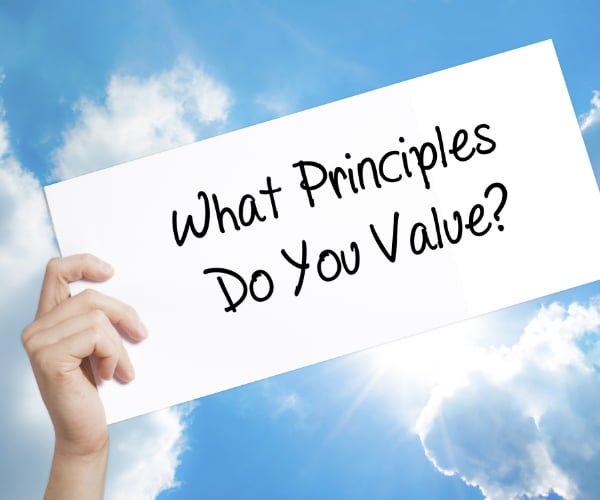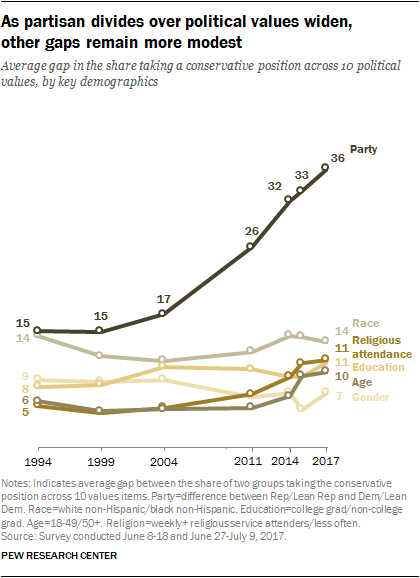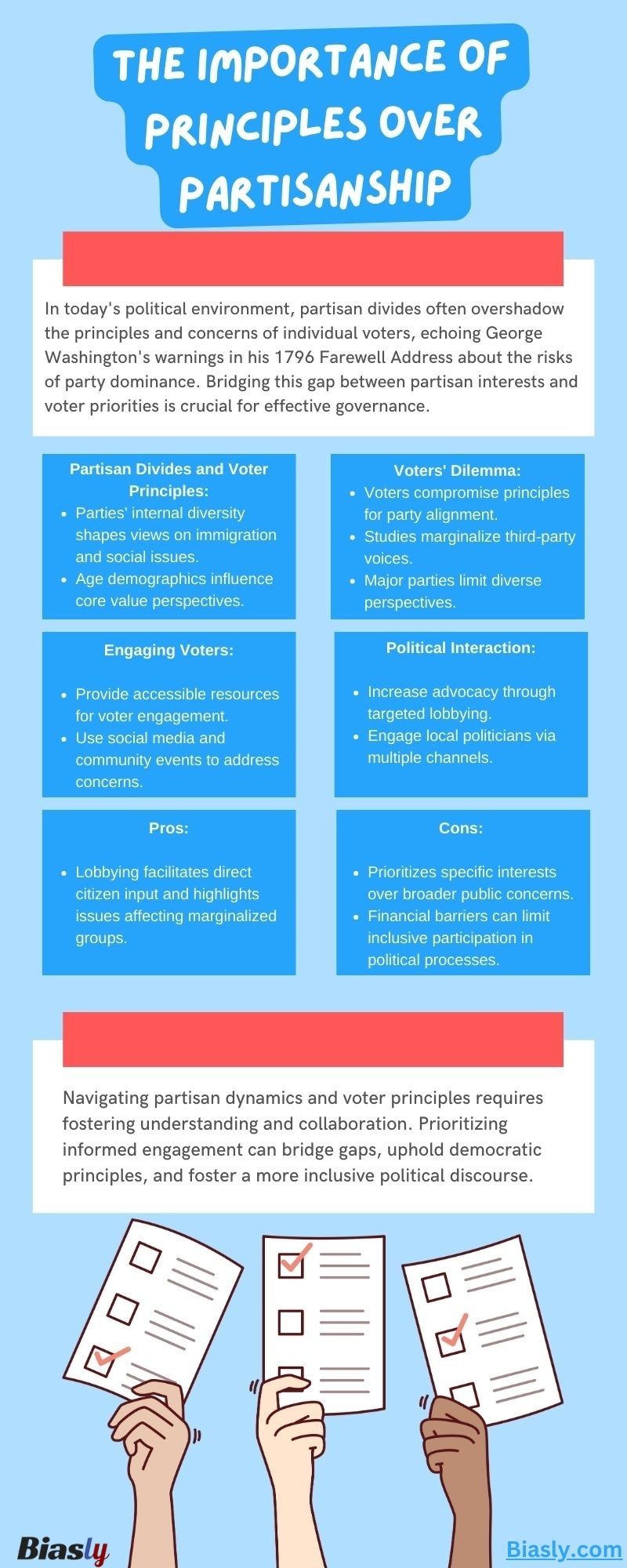
With feuds happening very frequently between parties in the government, this leaves the voter asking themselves one question: What about what I want? When former President George Washington gave his farewell speech in 1796, he addressed the same concerns that face modern Americans today regarding increased partisanship. With the partisan divide, people must ensure their voices are also taken into consideration when any politicians aim to take action. It is time to take a look at the increased political gap between the United States parties, and how principles should be at the forefront of campaigns, not affiliation.
“However [political parties] may now and then answer popular ends, they are likely in the course of time and things, to become potent engines, by which cunning, ambitious, and unprincipled men will be enabled to subvert the power of the people and to usurp for themselves the reins of government, destroying afterwards the very engines which have lifted them to unjust dominion.”

George Washington, Farewell Address (1796) (Image: public domain)
The Party’s Principles Vs. The People’s Principles
With the distrust and general lack of a relationship between the people and political parties, this has to be addressed in order to allow collaboration to ensue. It is complicated for these two to be able to work together due to the conflict that needs to be resolved inside their respective populations. We will work through explaining the differences and divisions between parties and voters, while also offering some strategies to help mediate conversations that can enable them to work together. If a semblance of unity can be achieved, these two groups can collaborate to advocate for the principles the voters have raised awareness to.
The Divide Among Parties
While many people tend to focus on the differences between political parties, there are also differences among the people that form part of these parties as well that cause the voters to not trust their stances. Despite the vast differences between voters and their ranging demographics, it can be shown by the Pew Research Center, that partisan interests are what separates people the most. With ranging age groups inside parties, their views on principles and values change as well. For example, The majority of Republicans under 30 believe immigrants are a benefit to the nation (62%), while around a quarter of those above 65 agree (31%.) Despite still remaining inside the same party, there are differences among these groups as well. Having voters be witness to this causes them to believe that their concerns will not be addressed if there are already problems within the groups.

The Divide Among Voters
The principles of voters have grown murky as government institutions prioritize the popularity of partisan groups in the political arena. Due to this, voters may abandon their individual principles and go along with the party that is bound to get them attention in the government despite not fully agreeing with them. In a study, published by the American Political Science Review, it was shown that voters will make tradeoffs when choosing candidates to represent them based on their partisan affiliations. This means that voters will support candidates who share similar views, despite also thinking that other ideals they hold are “undemocratic.” Voters have grown to see the heavy influence major partisan groups, such as Democrats and Republicans, have. They do not have much faith in relying on third-party groups. Despite these third-party groups having similar ideas, liberal and conservative stances have become the most popular within the political arena. As a result, people will trade-off principles to appease partisanship in hopes their voices will be heard, even if not completely.
A Roadmap to Collaboration
Despite divisions, voters and partisan groups should be able to work together. Parties should be able to relay information to voters and redirect them to resources they may need, as well as portray information in accordance with the audience they plan to reach.
Tips for Voter Interaction
- Allocate voters to resources on your organization’s websites or offer knowledge in response to any questions they may have about your campaign and voting questions
- Offer voting guides to make the voting process easier and motivate voters to come out
- Be honest, and address questions voters may have
- Know your audience, asses if your message is aimed towards college students, older citizens, specific races, etc
- Relay information easier through social media, have several ways, or platforms, where people can access information
- Holding town hall meetings, panels, or visiting specific communities builds a presence and relationship with the community
Great resources are available for specific cities, states, and non-partisan voter guides are available as well. These provide voter registration, voting plans, and other ways to vote (such as absentee ballots,) with more specific regional websites depending on your location.
Tips for Political Interaction
- Raise political awareness and create groups aimed to lobby for community interests
- Reach out to local politicians through cold calls, emails, or letters
- Allocate specific people to be the spokesperson of groups and present the groups’ beliefs to partisan groups appropriately
- Interact with politicians through social media and their pages, as well
- Hold events to teach others about the voting process and their voting locations
How can competing lobbyists positively and negatively affect the existence of healthy principles in politics?
Despite being a great way for public interests to be discussed within the political arena, competing lobbying interests can also have a negative effect on the principles addressed. The Pros and Cons list below presents both sides, displaying how lobbyists encourage political interaction, and how they also influence laws that deter the goals held by the public interest.
Pros
- Individuals will be able to communicate interests and concerns even more directly to politicians
- Elected officials may become aware of new solutions, or concerns, presented by the people
- Lobbying is easily accessible and anyone may participate in this action
- Generally, lobbying brings light to issues that affect any marginalized groups
- Builds a relationship between lawmakers and lobbyists
Cons
- Typically, lobbyists only focus on the interests of one group of people
- People will not always get heard, nor meet, their goals
- Lobbying can be a controversial topic as it influences and aims to persuade political changes/beliefs
- Lobbying sometimes requires large financial costs as companies or people aim to persuade others within the political arena
- May be time-consuming and might not always produce desired goals
While partisan groups may be a great way for voters to join their political arena, they can also be complicated when discussing the principles the people care the most about. With the tips above, a healthy relationship can be built between the two that will allow principles to reign over any political affiliations. Voters should also be well informed about the stances and values that each partisan group upholds, which will help them decide who to appeal to based on their interests. With Biasly’s Political Party Stances page, people are allowed to have an overview of the issues that are important to them. By being informed, lobbyists and lawmakers will be able to understand each other better, voters will receive necessary information regarding politicians, and a divided people can better focus on the goals that unite them rather than their differences.























